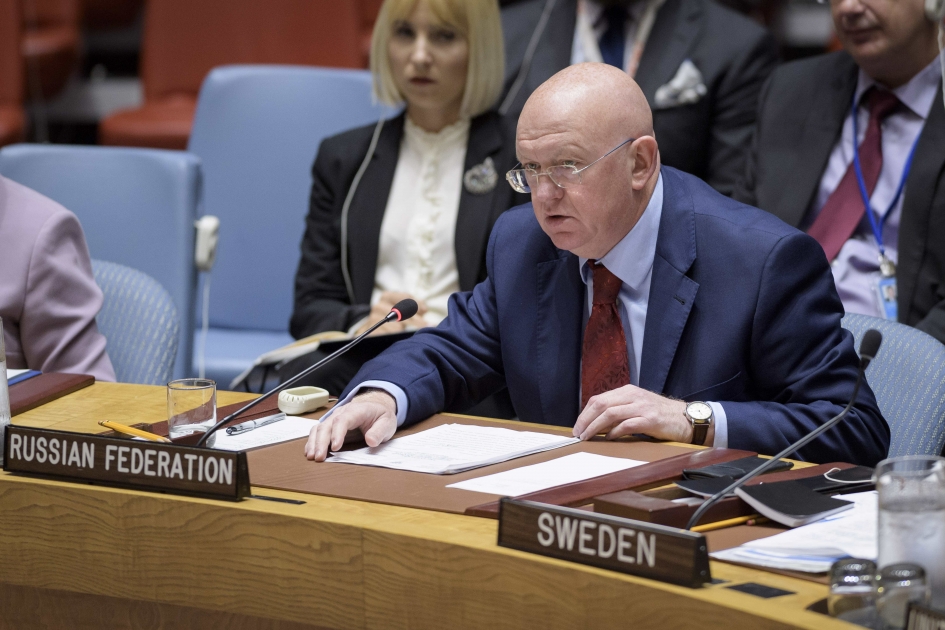Statement by Ambassador Vassily A. Nebenzia, Permanent Representative of the Russian Federation to the United Nations, at the Security Council meeting on Maintanance of International Peace and Security: Corruption and Conflict
At the outset, we would like to thank the Secretary-General for the information he provided and his assessment of the threat of corruption in situations of conflict.
We also thank Mr. Prendergast for his briefing. Yes, conflicts do provide scope for profit and many people do indeed profit from them. We should not forget, however, that many conflicts are provoked by struggles, both concealed and open, over natural resources. And this is about external and well as internal players.
Nowhere is that more evident than in Africa, where the thought of its undeveloped natural resources gives many no rest. We could term that the reverse side of corruption. As the Secretary-General rightly said today, corruption is a feature of both rich and poor countries. It also exists in the United States, which lectured us about corruption today. It exists there in its traditional forms, but it is frequently disguised through unique institutions such as legalized lobbying.
So if people want to discuss the subject in the Security Council, it would be more logical for them to start at home, and specifically with lobbying, which envelops the highest levels of power in the United States and is dictated by the interests of numerous private military companies, whose commercial interests are inextricably entwined with those of the powerful defence lobby in the Capitol. For the Council’s information, the cause of the conflict in Ukraine was not Yanukovych’s corruption but a coup d’état that exchanged one corrupt regime for another, which, unlike that of Yanukovych, has actually waged war on its own people.
There are members of the Council who are well aware of the scale of the corruption in Ukraine because those people are their protégés. And it is that corruption, including in the military, that is fuelling the conflict in south-eastern Ukraine. The Russian delegation has consistently advocated strengthening the central coordinating role of the United Nations in uniting the international community’s efforts to prevent corruption and combat such scourges. In our view, the United Nations Convention against Corruption is a robust international legal framework for developing international cooperation in this area.
Russia was one of the first countries to sign the Convention, in December 2003, and to ratify it, in March 2006. In 2015, the sixth session of the Conference of States Parties to the Convention was held in Saint Petersburg. We pay particular attention to the Mechanism for the Review of Implementation of the Convention, which we consider unique, open, transparent and unpoliticized, and which functions as an intergovernmental process based on respect for the principles of the equality and sovereignty of States and of non-intervention in domestic affairs. We support strengthening the role of the United Nations and of the United Nations Office on Drugs and Crime (UNODC) in providing expert assistance to States in their efforts to effectively implement the provisions of this critical Convention, and in UNODC’s efforts to ensure its universalization.
Russia is a major donor to UNODC’s anti-corruption projects, including a number of joint initiatives such as the annual preparatory courses for contacts and Government experts participating in the review of the Convention’s implementation. In 2017, Russia provided financial support for the operations of the United Nations Convention against Corruption Legal Library and the Tools and Resources for Anti-Corruption Knowledge web portal. In June in Vienna, on the eve of the World Cup, together with UNODC and with support from the BRICS countries, Brazil, Russia, India, China and South Africa, we held an international conference on preventing corruption in sports.
As we know, intergovernmental open-ended working groups have been established in the framework of the Convention to review measures on preventing corruption, ensuring the restitution of assets and bringing together experts on international cooperation. All these formats are open, intergovernmental and technical in nature. There are still gaps and inconsistencies in States’ legal norms with regard to the restitution of criminally derived assets. In that connection, the Russian Federation has consistently supported the development of a corresponding multilateral international legal mechanism under the auspices of the United Nations, which would help to eliminate vague areas and would help to strengthen the coordination of the relevant bodies in supplying mutual legal assistance on criminal matters and extraditions, and in countering money-laundering.
As is blindingly clear, unpoliticized mechanisms for anti-corruption have been functioning effectively and are being developed at the United Nations. In that connection, we do not support initiatives aimed at enshrining the topic as some kind of so-called new challenge to international peace and security and thus making use of the forum and mechanisms of the Security Council in that context. That can only undermine the existing formats and would damage the practical cooperation of the relevant State agencies based on the United Nations Convention against Corruption.
We believe that the distribution of labour that exists in the United Nations enables us to productively tackle the challenges in the area of anti-corruption activity, and that changing it, especially to the detriment of the authority of the United Nations, is counterproductive. There are no objective reasons for it. For our part, we will continue to assist the specialized bodies and mechanisms of international cooperation in this area and in adapting them to reflect the evolution of existing threats.
